Rotor UNO hydraulic groupset first impressions
Clever hubs, lightweight cranks and the drivetrain that uses oil to change gear
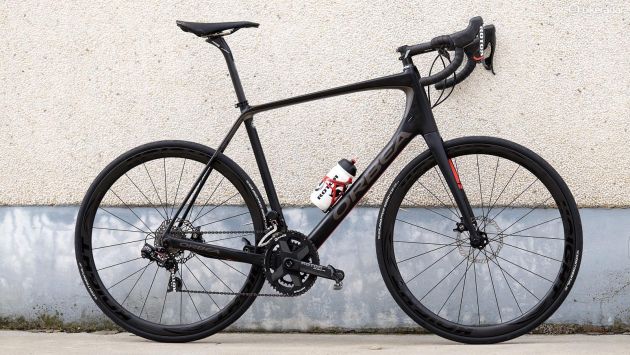
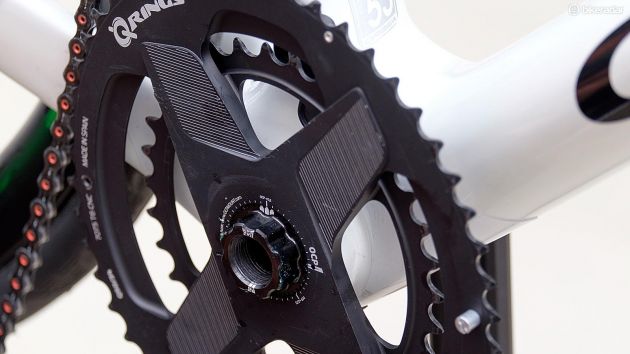
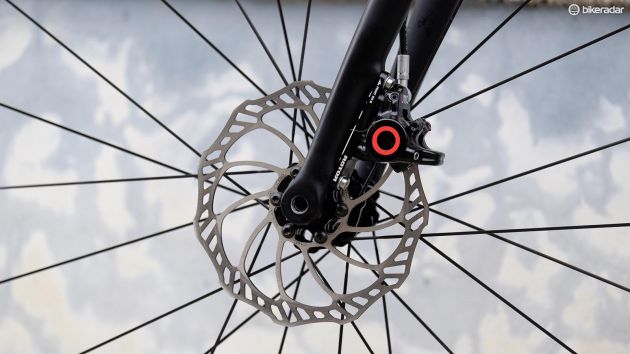
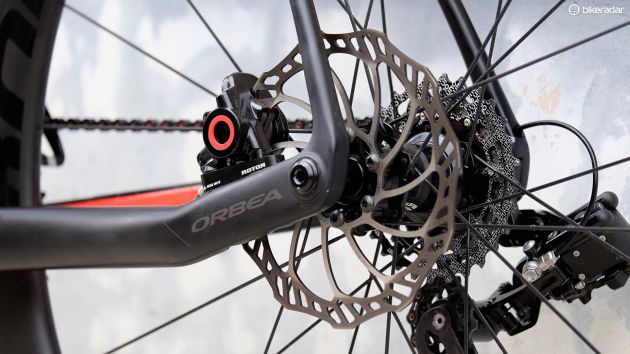
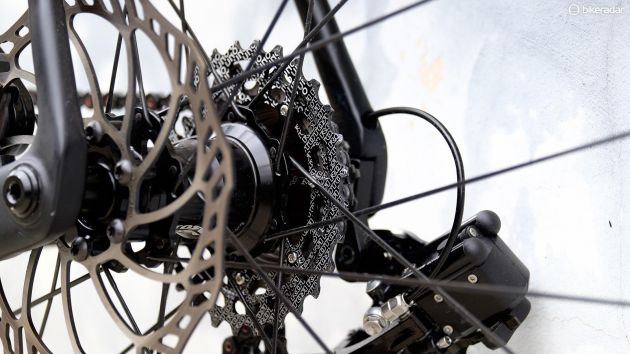
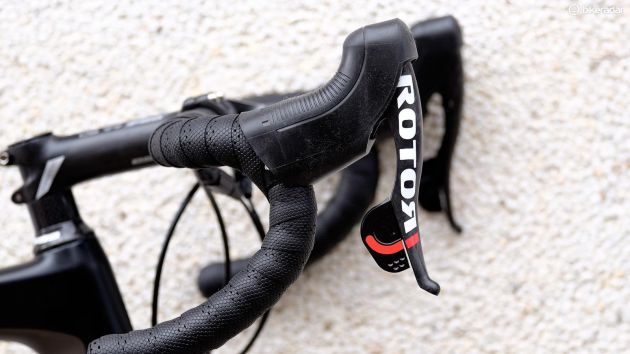
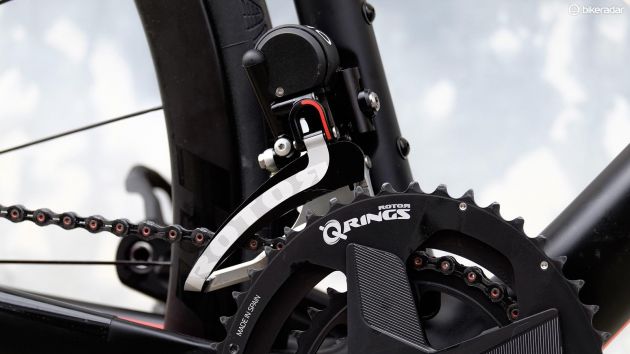
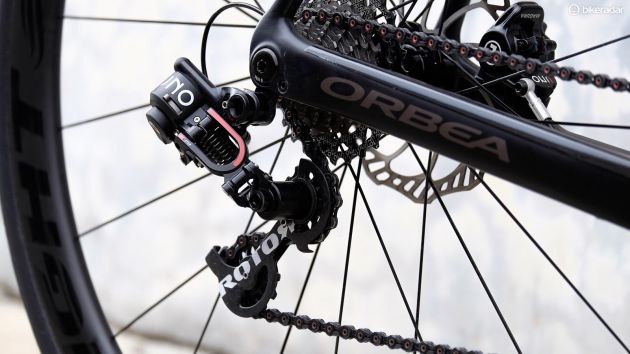
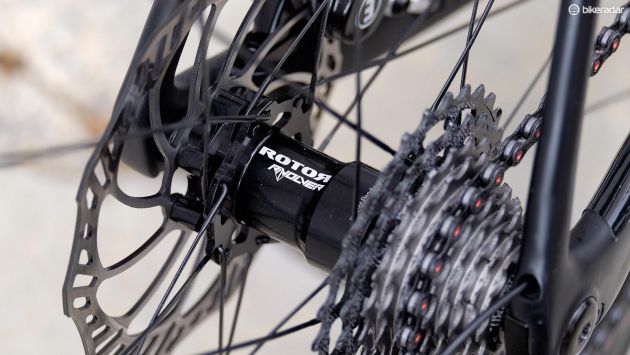
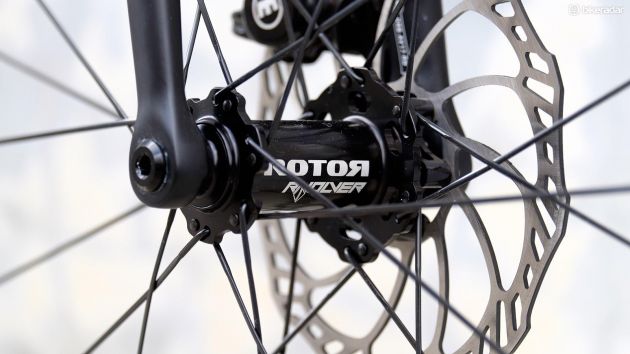
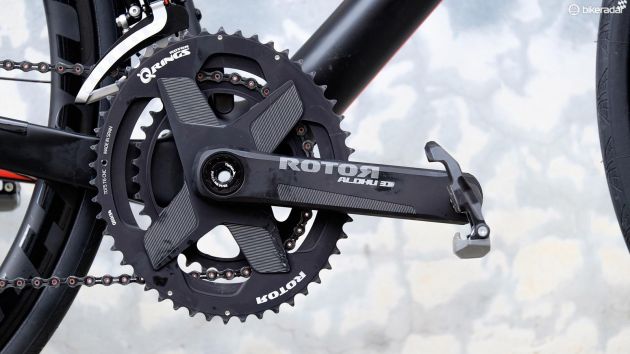
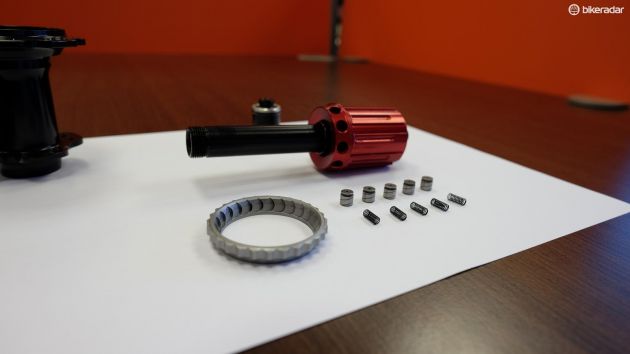
This article originally appeared on BikeRadar
BikeRadar was recently invited out to Madrid to test a few new components from Rotor, these included the company's lightest ever crankset as well as its innovative Rvolver hubs.
We were also able to revisit Rotor's hydraulically actuated groupset, the UNO — a long-awaited rarity that still holds the crown for the lightest disc-specific group.
Rotor Aldhu 3D+ chainset

The Aldhu 3D+ chainset uses no external bolts, making for an exceptionally clean look
Named to commemorate Rotor sponsored athlete Carlos Sastre's first victory at Alpe d'Huez during the 2008 Tour de France, the Aldhu 3D+ crankset uses direct-mount chainrings in a modular design that brings more adjustability and customisation than any Rotor crank before it. Rotor claims that it's also the lightest crank to date from the company and — just like the rest — it's 100 percent made in Madrid.
The Aldhu 3D+ chainset comes in at a claimed 599g (50/34t in 170mm), that's compared to a claimed 609g for a Dura-Ace R9100 in 50/34t or the GXP version of SRAM's RED chainset which once again totals 609g in the 50/34t and 172.5mm flavour.

Take away the crank arm and you can see the splines and associated markings that allow the Aldhu 3D+ so much adjustment
Get The Leadout Newsletter
The latest race content, interviews, features, reviews and expert buying guides, direct to your inbox!
A Rotor crank would not be a Rotor crank without Q-rings, and those fitted to the Aldhu 3D+ arrive with more adjustability than ever before thanks to a refined version of the company's OCP (optimum chainring precision) mount.
This splined spider allows a rider to precisely adjust the orientation of Rotor's ovalised q-rings. The system allows for a wide window of adjustment outside of the standard five OCP points, yet can be narrowed down to just +/- 1 degree, the idea being that one can dial in the setup to best optimise the mechanical advantage of the Q-ring for their biomechanics and bike setup
A complete Aldhu 3D+ chainset comes in at £495 / €499,97 / $600 / CNY4,500.
Rotor Rvolver hubs

Rotor's Rvolver hubs use large bearings from supplier Enduro
Announced earlier this year, the Rvolver hubs use an inventive clutch system to reduce friction — and therefore rolling resistance — when a rider is coasting. The guts of the hub make use of fewer internal components than a regular ratchet and pawl system and mean the design's ratchet ring can connect to the hub's shell without threaded parts, meaning it is lighter than a conventional design too.
As a result, these hubs are directly comparable with similarly priced items from DT, while a forthcoming centrelock version should see a pair of Rvolvers coming in at around 20g below the equivalent DT 240s.
Inside, the clutch system moves — or “floats” — a ratchet ring away from the hub's pin-shaped pawls when the rider stops pedalling, thus disengaging the drive in an inventive way to reduce friction, and thereby decreasing rolling resistance and increasing coasting momentum.

The relatively simple guts of Rotor's Rvolver hubs are designed to reduce friction when coasting
Once torque is applied again, each pin shaped pawl makes contact with one of the many tapered teeth, producing a threading effect taking the crown back to its torque position while the pawl rotates into its housing like a meshed cog.
At present, all Rvolver hubs are compatible only with J-bend spokes in a paired configuration, this has allowed Rotor to machine the flanges more aggressively without sacrificing strength, this also produces desirable bracing angles for easy wheel assembly. Straight pull versions are expected to arrive in spring 2018.

The Rvolver hubs can be stripped down quickly and without any specialist tooling
Rotor tends not to outsource anything that it doesn't absolutely have to. In fact, the only parts of these hubs that are not manufactured in Rotor's Madrid facility are the tiny springs that actuate the pawls and the large cartridge bearings and seals which are sourced from popular supplier Enduro.
Disc and rim versions are available with a choice of axle sizes to fit both road and mountain bikes. The Rvolver hubs are available now with pricing starting at £147 / €147 / $147 for the front and £328 / €328 / $328 for the rear.
UNO groupset ride impressions

The large hoods proved comfortable while a large surface area means there's no chance of missing the levers on each shifter
In order to try out the above components Rotor partnered me up with an Orbea Avant that was built with a complete Rotor UNO groupset.
This ultra-rare group has not had an easy life — for a start, nobody really seems to understand why it exists in the first place. Rotor literally made it to stand out from the crowd, to differ from the mechanical derailleurs that have been refined to absolute brilliance over the last seven or eight decades.

The shifting of Rotor's Uno group is actuated by a closed hydraulic system
UNO would've been a massive undertaking for one of the big three names in gears, so for Rotor with its 110 employees it was an absolute behemoth of a task.
Using a closed hydraulic system to actuate its derailleurs, UNO aims to bring the best aspects of both mechanical and electronic shifting, yet it has to do so in a way that doesn't infringe on the tight patents held by the biggest players in the drivetrain game.
To use the groupset demanded my full attention. There's a DoubleTap style shift arrangement, so push once at the single large right-hand lever and you'll shift up the block, continue to push past this point and the derailleur will instead move the chain into a lower gear.

The front derailleur uses four trim positions, meaning you'll have to shift it twice as often as most
The front derailleur has four trim positions, neglect to use these and it will create an audible protest. I've not had to think this much about changing gears since I started to ride road bikes.
UNO's shifters give more of a squish than a click, which shouldn't come as a surprise but somehow does. Changing up was rapid with a very short throw, while climbing the block was slower with a significantly longer action.
Fettlers may like the fact the shifters can be adjusted to provide up to four downshifts in one movement of the lever, but the shifter's lack of feedback means that it'll take practice to learn exactly how many you're going to get.
Also, inside the hoods are hydraulic brakes from Magura. These aren't the most powerful road discs in the business but have loads of feel and certainly kept me feeling safe when descending.

Sharing space at Uno's hoods is a regular open system hydraulic brake made by Magura
All in, my experience with UNO largely mirrors that of my colleague Matthew Allen, who eloquently summarised his time with the group way back in 2016. Back then, Rotor was trying to work around a patent issue that had arisen from UNO's cassette, meaning the bikes on that launch were fitted with Shimano blocks. Buy an UNO group now however and it'll arrive with its own cassette, an exquisitely machined block of aluminium that weighs just 135g.
And with that comes UNO's most impressive stat. It claims to be the lightest hydraulic disc groupset out there at just 1,655g. That's compared to Shimano's Dura-Ace R9120 mechanical/hydraulic group at 2,445g or 2,119g for SRAM Red Hydro.
Other than its weight-weenie prospects the only reason I think you'd really buy UNO is to be different, to own something exclusive, something beautifully made and special. I really couldn't blame someone for doing that.
The UNO Groupset is available now and retails for £2,400 / €2,449 / $2,500.